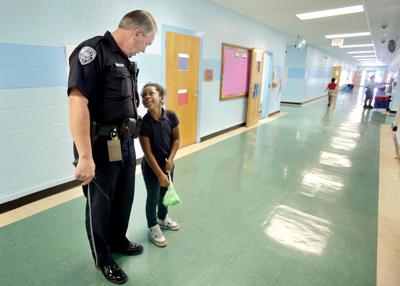City police officers will be stationed in Charleston's elementary schools when students return for their first day on Aug. 21.
Charleston Police Chief Luther Reynolds told members of the city's Public Safety Committee on Thursday how the school resource officer program would be expanded to 17 elementary schools in the city.
Under the plan, six officers in the city's 18-officer School Security Response Team would instead work as school resource officers. Five existing patrol officers would be reassigned, as would six officers with the Charleston County Sheriff's Office, Reynolds said.
School resource officers have been stationed in Charleston middle and high schools for more than 30 years, but the steady presence in elementary schools will be new, and will include officers in public, private and charter schools.
The roll-out would be cost-neutral to the city through the end of the calendar year, but in January when the city adopts its budget, the early estimate of the cost is about $1.9 million, Reynolds said.
In total, school security in Charleston schools would cost more than $4 million, which includes staffing 12 officers in the school security response team, 11 school security officers in the middle and high schools, 17 in the elementary schools, and three supervisors.
The county and school district are expected to approve funding ahead of July 1, the start of their fiscal year. The county will consider setting aside $3.2 million for the school resource officer program, spokesperson Shawn Smetana said.
During Thursday's meeting, Mayor John Tecklenburg said the Charleston County School District would pay about $600,000.
On Friday, Tecklenburg praised the school safety response team program and school resource officer combination, noting that school security has been a priority.
In the past month, Tecklenburg said he has spoken to school principals about the city's school safety response team and school resource officer programs. He said the school district, county and city have been working collaboratively on this issue.
"I don't think any other jurisdiction locally has that same combination," Tecklenburg said. "They don't do traffic stops and other criminal investigations or duties of the police department. They are 100 percent focused on school safety and they have the equipment, training and built relationships with all schools. It's really an excellent concept."
Discussion will continue over the coming months to finalize an agreement between the city, school district and county, he said. Additional staffing at the police department ultimately will require a City Council's approval later this year.
As city leaders consider a new budget this fall, Reynolds said the department will look at other ways to address school security, noting the school resource officer program is a "tremendous commitment."
"Putting a cop in an elementary school does not make it safe," Reynolds said. "It takes training, communication, leadership and good policy. And we're going to continue to work on that. ... We want to add value to the learning environment."
Though there was a school resource officer at Marjory Stoneman Douglas High School in February 2018, he wasn't trained and policies were not in place to handle a mass shooting. That shooting claimed the lives of 17 students and teachers and injured 17 others.
Reynolds said the city should be mindful of continued training, effective communication and strong policies in place to be prepared for a mass shooting.
The city created its School Security Response Team program after the Sandy Hook massacre in Newtown, Conn., in December 2012. Charleston's team is trained to handle active-shooter situations, moving from one school to the next. That program is modeled off the Hercules program in New York City.
Instead of staffing city elementary schools, police officers in the roving, "predictably unpredictable" unit would stop in and visit schools, doing walk-throughs during the school day.
Charleston County Chairman Elliott Summey advocated for expansion of the program, even if the county were to take on the cost. In an emailed response after The Post and Courier's press time Summey said he appreciated the collaboration between the city and county.
"It's not just for safety; but helping to bridge the relationship between law enforcement and our community through budding relationships with our children," Summey said. "The county stands ready to assist our school children in any way possible."







